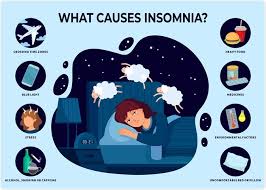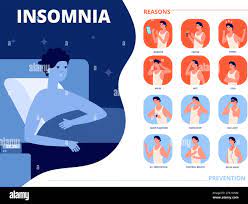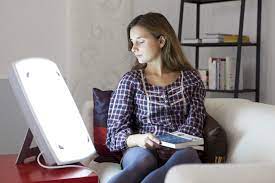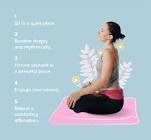Understanding the Link Between Alcohol, Insomnia, and Anxiety
Alcohol consumption is often associated with relaxation and socializing. Many people turn to alcohol to unwind after a long day or to ease social anxiety in social settings. However, what some may not realize is the detrimental impact that alcohol can have on sleep and mental well-being.
One common issue that arises from alcohol consumption is insomnia. While alcohol may initially make you feel drowsy and help you fall asleep faster, it disrupts the quality of your sleep. This can lead to fragmented sleep patterns, frequent awakenings during the night, and overall poor sleep quality. As a result, individuals who consume alcohol before bedtime may experience fatigue, irritability, and difficulty concentrating during the day.
Moreover, chronic alcohol use can contribute to the development or exacerbation of anxiety disorders. Alcohol affects neurotransmitters in the brain that regulate mood and emotions. Over time, excessive alcohol consumption can disrupt this delicate balance, leading to increased feelings of anxiety and even triggering panic attacks in susceptible individuals.
It’s essential for individuals struggling with insomnia and anxiety related to alcohol consumption to seek help and support. Consulting with healthcare professionals or mental health experts can provide valuable insights into managing these issues effectively.
In conclusion, while alcohol may seem like a quick fix for relaxation or social anxiety relief, it’s crucial to be aware of its potential negative effects on sleep quality and mental well-being. By understanding the link between alcohol, insomnia, and anxiety, individuals can make informed decisions about their drinking habits and prioritize their overall health.
Understanding the Relationship Between Alcohol, Insomnia, and Anxiety: Frequently Asked Questions
- How does alcohol consumption affect insomnia and anxiety?
- Can alcohol worsen existing insomnia and anxiety symptoms?
- What are the long-term effects of using alcohol to cope with insomnia and anxiety?
- Are there alternative strategies to manage insomnia and anxiety without relying on alcohol?
- How can I break the cycle of using alcohol to self-medicate for sleep and anxiety issues?
- What professional help is available for individuals struggling with alcohol-related insomnia and anxiety?
How does alcohol consumption affect insomnia and anxiety?
Alcohol consumption can have a significant impact on both insomnia and anxiety. While alcohol may initially induce feelings of relaxation and drowsiness, it disrupts the natural sleep cycle, leading to fragmented and poor-quality sleep. This can exacerbate insomnia symptoms, causing individuals to experience difficulty falling and staying asleep. Additionally, chronic alcohol use can disrupt neurotransmitters in the brain that regulate mood, potentially increasing feelings of anxiety and contributing to the development or worsening of anxiety disorders. It’s important to recognize the link between alcohol consumption, insomnia, and anxiety and seek appropriate support and guidance for managing these interconnected issues effectively.
Can alcohol worsen existing insomnia and anxiety symptoms?
Alcohol consumption can indeed worsen existing insomnia and anxiety symptoms. While alcohol may initially induce feelings of relaxation and drowsiness, it disrupts the natural sleep cycle, leading to fragmented and poor-quality sleep. This can exacerbate insomnia symptoms, making it harder to fall asleep and stay asleep throughout the night. Additionally, alcohol’s impact on neurotransmitters in the brain can heighten feelings of anxiety and contribute to increased levels of stress and agitation. It’s important for individuals with existing insomnia and anxiety issues to be cautious about alcohol consumption as it can negatively affect their sleep patterns and mental well-being.
What are the long-term effects of using alcohol to cope with insomnia and anxiety?
Using alcohol as a coping mechanism for insomnia and anxiety can have significant long-term effects on both physical and mental health. While alcohol may provide temporary relief by inducing drowsiness and reducing feelings of anxiety, it ultimately disrupts the natural sleep cycle and can exacerbate anxiety symptoms over time. Chronic alcohol use can lead to tolerance, dependence, and withdrawal symptoms, making it increasingly challenging to achieve restful sleep without alcohol. Additionally, prolonged reliance on alcohol to manage insomnia and anxiety can contribute to the development of substance use disorders and worsen overall mental well-being. Seeking professional help and exploring healthier coping strategies is crucial in mitigating the detrimental long-term effects of using alcohol as a solution for sleep and anxiety issues.
Are there alternative strategies to manage insomnia and anxiety without relying on alcohol?
Many alternative strategies exist to manage insomnia and anxiety without relying on alcohol. These include establishing a consistent sleep routine, practicing relaxation techniques such as deep breathing or meditation, engaging in regular physical exercise, limiting caffeine intake, and seeking support from mental health professionals or counselors. Cognitive-behavioral therapy (CBT) has also been shown to be effective in treating both insomnia and anxiety by addressing negative thought patterns and behaviors that contribute to these issues. By exploring these alternative approaches, individuals can develop healthier coping mechanisms and improve their overall well-being without the need for alcohol.
How can I break the cycle of using alcohol to self-medicate for sleep and anxiety issues?
Breaking the cycle of using alcohol as a self-medication for sleep and anxiety issues requires a multifaceted approach that addresses both the underlying causes of these problems and the unhealthy coping mechanism of alcohol consumption. Seeking professional help from healthcare providers, therapists, or support groups can provide valuable guidance and tools to manage insomnia and anxiety effectively. Developing healthy sleep habits, practicing relaxation techniques, engaging in regular exercise, and exploring alternative therapies such as cognitive-behavioral therapy can all contribute to breaking the cycle of reliance on alcohol for relief. It’s essential to understand that addressing the root causes of sleep and anxiety issues is crucial for long-term well-being and mental health.
What professional help is available for individuals struggling with alcohol-related insomnia and anxiety?
For individuals grappling with alcohol-related insomnia and anxiety, seeking professional help is crucial for effective management and support. There are various resources available to assist those facing these challenges, including mental health professionals such as therapists, counselors, and psychologists who specialize in addiction and sleep disorders. Additionally, seeking guidance from healthcare providers like doctors or psychiatrists can provide personalized treatment plans, medication options, and monitoring of physical and mental health. Support groups and rehabilitation programs tailored to addressing alcohol use disorders and co-occurring conditions like insomnia and anxiety can also offer valuable peer support and coping strategies. It’s essential for individuals to reach out for professional help to address the complex interplay between alcohol consumption, sleep disturbances, and mental well-being in a comprehensive and sustainable manner.




